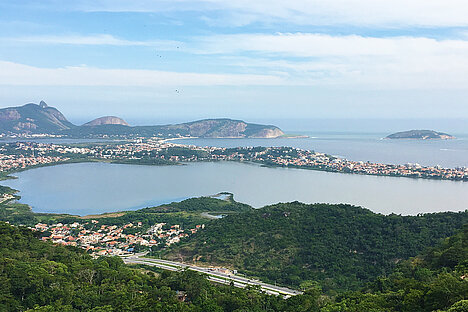- DE |
- EN
In Quito, organic waste will soon be composted and thus recycled.
Overview
Waste management experts from the Ecuadorian capital Quito and Hamburg (Germany) designed a first pilot composting plant for organic waste. It intends to serve the city of Quito as an introduction to sustainable waste recycling.

Initial Situation
In Quito, the capital and second largest city in Ecuador, almost 2,000 tonnes of waste are generated every day. It ends up at the city's only landfill, El Inga, which has already almost reached its capacity limit. Almost 50 percent of the waste is organic material. The waste sector is responsible for 13 per cent of the city's emissions, the most important being methane emissions, which are produced when the organic waste decomposes in the landfill.
Quito began developing a master plan for integrated waste management in 2016. This plans to build a composting plant in the short term and an anaerobic digestion plant in the long term. In addition, the waste volume is to be reduced by five per cent and 25 per cent of the waste is to be recycled or processed by 2025.
Learning Experience
The dialogue event "Plastic waste: the contribution of municipal waste management to tackle the issue", organised by Connective Cities and the City of Hamburg in December 2019, focused on the contribution of municipal waste management to solving the plastic waste problem. The nearly 40 participating municipal practitioners from 13 cities around the world shared good practices and projects on how municipalities can address the large amounts of plastic waste. They developed project ideas for eight cities to better deal with plastic waste. At the end of the event, three excursions led to a waste incineration plant, a sorting station and a waste collection point in Hamburg.
Stadtreinigung Hamburg and the municipal waste management company "Empresa Pública Metropolitana de Gestión Integral de Residuos Sólidos" (EMGIRS-EP) from Quito discussed the possibilities of recycling organic waste in addition to the conference topic of plastic waste. At the dialogue event, they further discuss the idea for the construction of a pilot composting plant for organic waste in Quito.
Connective Cities then facilitated an exchange between experts from Hamburg and Quito, who concretised this idea in a first design document for the construction of the pilot composting plant.

Project Ideas
The virtual exchange gave rise to the idea of Quito building a composting plant as part of a pilot project in line with its master plan for integrated waste management. At the El Troje landfill, it is to have a capacity of about ten tonnes of organic waste per day. In addition, the jointly developed design for the plant will serve as a starting point for the improvement of sustainable organic waste treatment by EMGIRS-EP in Quito. It is to gain important experience during the planning, implementation and operation phases of the composting plant.
A feasibility study and an implementation plan for the Quito Organic Waste Management Project, which EMGIRS-EP had prepared with the city's Environment Secretariat at the end of 2018, served as the basis for the project idea.
Activities
Experts from Hamburg and Quito continued to advance the planning of this pilot plant. For this, it was planned that a team from Germany would travel to Quito on an expert mission. Due to the Covid 19 pandemic, this was not possible and so a virtual exchange took place from April to November 2020, which Connective Cities financed and accompanied. The experts from Quito and Hamburg discussed the specifics of the pilot composting plant to be planned, such as the space and personnel requirements, the machines needed, the capacity of the plant, as well as planning and operating processes, which they recorded in an initial design document for the construction of the pilot composting plant.
In the concept, they jointly designed a pilot composting plant adapted to the conditions in Quito with a capacity of 3,000 to 4,000 tonnes of organic waste per year. They recommended the construction of a plant with a manageable size because it would be well suited to train the waste management staff in composting techniques before the city builds a more technically complex plant in a next step. Nevertheless, they directly considered a possible capacity expansion to 20,000 to 40,000 tonnes per year.

Perspective
The construction of a forced-air composting plant with a processing capacity of 40,000 tonnes per year, as proposed in the draft plan, would cost at least US$ 4,000,000. Quito Waste Operations began to find funding sources for the facility after the planning document was finalised.
The pilot composting plant would contribute to a sustainable organic waste management system in Quito and represent the Quito Metropolitan Municipality's entry into waste recycling.
Stadtreinigung Hamburg has already offered to support Quito with advice and expertise exchange during the implementation and operation phase of the pilot composting plant if needed.
further information
Plastic waste: the contribution of municipal waste management to tackle the issue
Connective Cities Dialogue Event
Development of a context-appropriate pilot composting plant in Quito, Ecuador
Virtual exchange between experts from Quito and Hamburg.
Published: 12/05/2022
Contact
Thorben Knust
Technical advisor of integral waste management
Metropolitan Public Company of Integral Waste Management (EMGIRS-EP)
Metropolitan District of Quito
Mail: comunicacion(at)emgirs.gob.ec
















